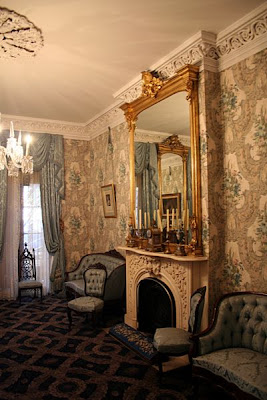 Tabloids today are still focusing on salacious events as they did in 1836
Tabloids today are still focusing on salacious events as they did in 1836 is known as the
birthplace of Tabloid journalism and newspapers. This is the notorious address where
Helen Jewett (
below), an upper class prostitute was murdered in her brothel in
1836. The murderer smashed her head in with an axe and later set her bed on fire. This was the first murder that was covered in detail by the city journalists and papers.
The increase in circulation guaranteed that this sort of reporting would become the common practice.Jewett (
1813-1836) was borne in Maine to a working class family and her first job was as a servant girl in the home of The Lord Chief Justice of the Maine Supreme Court where she developed into a sexually assertive young woman. Upon reaching the age of 18 she left her home and became a prostitute locally, eventually finishing up in New York City.

Jewett's body was discovered by the matron of the brothel at 3am on
April 10, 1836. The position of the corpse in bed indicated that the attack was not expected as there were no signs of a struggle. After inflicting the lethal blows, the murderer then set fire to Jewett's bed. The room was full of smoke and Jewett's body charred on one side. Based on the testimony of the women who lived in the brothel, the police arrested
19 year old Richard P. Robinson on suspicion of Jewett's murder. Robinson, a repeat customer of the victim, flatly denied killing her, and did not display much emotion when confronted by the still warm corpse. He was later charged with the murder.
On
June 2, 1836, Robinson's trial began and after days of testimony from several witnesses, including, Posina Townsend, the judge gave the jury its instructions and ordered that as most of the other witnesses were prostitutes, the jury must disregard their evidence. These instructions coupled with the circumstantial nature of the other evidence resulted in the jury only taking less than half an hour
to return a not guilty verdict.
An
illustration of the murder scene from a pamphlet. Richard P. Robinson with hatchet in hand.
The murder of Jewett and trial of Robinson excited the press and the public and the coverage was highly polarized, with reporters either sympathizing with Jewett and vilifying Robinson or attacking Jewett as a seductress who, according to 19th century standards, deserved her fate. Whichever stance adopted by each of the papers covering the story, none passed by the opportunity to exploit the sexual, violent details of Jewett's death. Never before had a crime and subsequent trial been so graphically and widely reported.
Post trial, personal letters of Robinson's became public which undercut some of the his claims and showed him to be capable of vicious and (for the time) deviant sexual behaviour. The public turned on him, including those that had been his most vocal supporters, as his guilt became clear. He eventually moved to Texas where he became a respected frontier citizen.
 You take a taxi to your health club to exercise.
You take a taxi to your health club to exercise. You think Central Park is "nature."
You think Central Park is "nature." Your favorite movie has DeNiro in it.
Your favorite movie has DeNiro in it.  You run when you see a flashing "Do Not Walk" sign at the intersection.
You run when you see a flashing "Do Not Walk" sign at the intersection. You go to a hockey game for the fighting. In the stands. To participate.
You go to a hockey game for the fighting. In the stands. To participate.






























 Watching the world go by
Watching the world go by











